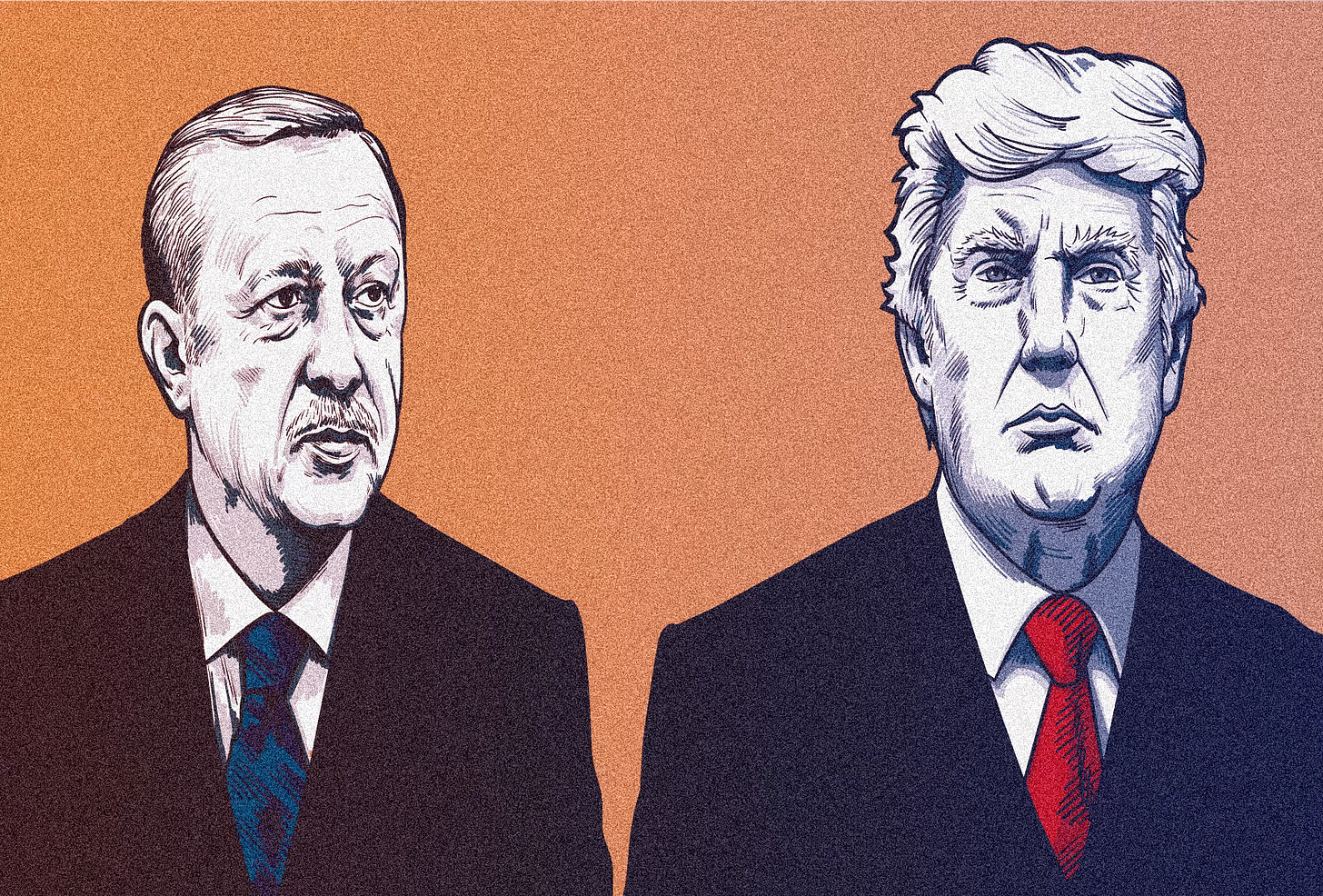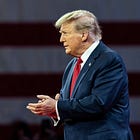The Dictator Whom Trump Resembles That No One Is Talking About
Trump admires Putin and Orbán, but Turkey’s Erdoğan might be his closest parallel

Trump has not concealed his admiration for populist authoritarians worldwide. He has gone out of his way to praise and laud “strong leaders,” such as Russia’s Vladimir Putin—whom he admired for “being able to kill whoever,” calling him a “genius.” And he’s on record noting that Hungary’s Viktor Orbán has “made some smart decisions we could learn from in the United States,” adding that there’s no one “smarter or a better leader” than the Hungarian strongman.
Much has been written about Trump’s parallels with these two leaders. But there is another strongman whom Trump could turn to for inspiration who has not received nearly as much attention: Recep Tayyip Erdoğan, Turkey’s president since 2014.
The two leaders represent opposite and conflicting ends of the civilizational pole: Erdoğan, a deeply devout Muslim, sees himself as the leader of the Islamic world and an antagonist of the West. Though not religious, Trump is positioning himself as the defender of Western Civilization.
But both are thoroughgoing illiberals who engage in populist politics and claim to represent the forces of “good” (the populace) against “evil” (the elites). They both rail against the Deep State, “derin devlet” in Turkey, even after Erdoğan, through his cunning, has defanged it. (The notion of the Deep State actually came to America from Turkey and referred to an unelected military brass that functioned as a shadowy parallel government, not anything that has ever existed here.) They both reject the current liberal-international order and harbor a deep disdain for their respective countries’ institutions that check executive power.
Understanding how Erdoğan transformed Turkey’s political system—rooted in the secular ideology of its founder, Kemal Atatürk—and quasi-democratic institutions into an illiberal regime that imposes a religious, nationalist ideology dominated by him would therefore be instructive. He has already reshaped the Turkish state and society in his image, just as Trump and his MAGA acolytes want to do in the United States.
Both Erdoğan and Trump are narcissistic, thin-skinned figures who expect unquestioning, cult-like loyalty, especially when they go after the enemies that they see everywhere. They engage in demagoguery and conspiracy theories, creating an alternate reality that helps them solidify their hold on their allies and sympathizers. This gives them a solid basis to try to flatten civil society and governing institutions—and impose their will on the country.
Contempt for Courts and the Rule of Law
Consider how, instead of fixing Turkey’s admittedly imperfect rule of law, Erdoğan has coopted it. He has attacked the judiciary, sacking thousands of judges and prosecutors who wouldn’t bend to his will, replacing them with inexperienced judges who would. He has then used the courts to punish antagonists and, equally importantly, protect cronies, allies, and friends (Trump himself is no stranger to protecting and rewarding loyalists and friends). In essence, he has given a real-life demonstration of what a system that a strongman uses to “punish his enemies and reward his friends,” as Trump and his allies are overtly seeking, would look like.
Turkish prisons are chock full of people whose sole crime was crossing or standing up to Erdoğan, like civil society leader Osman Kavala, who was sentenced to life imprisonment without parole for supposedly initiating the 2013 Gezi Park demonstrations against an urban development project and destabilizing the government. The scale of the two-and-a-half-million-strong demonstrations rivaled those in Arab Spring countries two years prior and badly spooked Erdoğan. The case against Kavala has received much international attention and resulted in a constitutionally binding ruling from the European Court of Human Rights (ECHR) for his release, which Erdoğan ignored.
The leader of the opposition Kurdish party, People’s Democracy Party, Selahattin Demirtaş, was also sentenced to life imprisonment on terrorism charges for allegedly inspiring protests in 2014 and insulting the president, a crime in Turkey. This was a naked attempt to neutralize Demirtaş, a charismatic politician who was responsible for his party’s unexpected election success and setbacks for Erdoğan’s party.
Trump, likewise, has made no secret of his wish to prosecute his opponents. During his presidency, the Department of Justice initiated politically motivated cases against former Obama secretaries of state Hillary Clinton and John Kerry, as well as former FBI Director James Comey, on an assortment of charges but they didn’t go anywhere.
It isn’t just opposition party officials Trump wants to go after but even his own if he thinks they are crossing him. He has called for the “execution” of the former Chairman of the Joint Chiefs of Staff, Gen. Mark Milley—because he kept a line of communication open with the Chinese during the last few turbulent months of the Trump presidency to avoid any dangerous misunderstandings. But his deepest desire for “retribution”—his word—is against Republicans who have had the temerity to attempt to hold him accountable to the rule of law. He’s vociferously called for former Republican Congresswoman Liz Cheney from Wyoming to be tried for treason—in a military court reserved for enemy combatants and war criminals, no less—because she cooperated with Democrats on the House Jan. 6 Committee to investigate his efforts to overturn the election and foment the attack on the Capitol. In other words, as far as Trump is concerned, he is the state.
Erdoğan has reached deep into civil society and charged tens of thousands of people, from journalists and politicians to ordinary citizens and even minors, with “insulting President Erdoğan”—in each case, the delineation of what constitutes an “insult” was primarily left to the the presidential palace. Similarly, countless newspapers and news websites have been subjected to capricious fines or shut down.
Likewise, Trump wants to silence the media—calling it the “enemy of the people”—and, most recently, threatened to scrap ABC’s broadcasting license after his poor debate performance that he blamed on the network’s moderators. He also wants Mark Zuckerberg to “spend the rest of his life in jail” for election interference should the Facebook founder, like in 2020, extend funding to boost local election infrastructure, which Trump believes, without any basis, went primarily to blue states and handed the election to Biden.
While the U.S. judicial system is significantly more resilient than Turkey’s, it is far from clear that it will hold in the face of outright contempt and open defiance that the Trump team, just like Erdoğan, has exhibited. Consider how both have handled the highest court in the land. On the rare occasion when the Constitutional Court diverged from Erdoğan’s preferred outcome, he defied its ruling. This year, for example, the court ruled that an opposition member elected to parliament should be released from jail and permitted to assume his seat. In refusing to implement the ruling, Erdoğan absurdly argued that a lower court’s prior verdict overruled that of the country’s highest court.
Likewise, JD Vance, Trump’s vice-presidential choice, has declared that if the Supreme Court objects to the duo’s plans to fire civil servants and replace them with loyalists, the administration should ignore the ruling. It should “stand before the country like Andrew Jackson did and say the Chief Justice has made the ruling, now let him enforce it.”
This is not unlike Joseph Stalin’s infamous invocation at Potsdam, “The Pope! How many divisions does he have?”
Undermining the Independence of Agencies
Both leaders display supreme self-confidence in their knowledge and command of facts and history, reinforced by the sycophants around them, often resulting in poor decision-making. Erdoğan compelled the supposedly independent Central Bank to drastically reduce interest rates because, contrary to all economic logic, he believed that would lower inflation. He got his way, and inflation skyrocketed, putting the Turkish economy into a tailspin. In the end, without ever admitting he had been at fault, he completely reversed course, but the damage to the lives of millions of Turkish people had already been done.
Likewise, Trump has also berated the Federal Reserve for refusing to lower interest rates to juice the economy during his first term. More recently, he warned Fed Chair Jerome Powell not to reduce interest rates until after the election and has accused him of siding with his opponents. He and his entourage have been contemplating plans to put the agency under “presidential control,” completely eviscerating its independence and politicizing it.
Foreign Policy as a Personal Tool
Like all potentates, Trump and Erdoğan want to be acclaimed as influential global leaders. That means their foreign policy is simply a projection of their personal ambitions.
To this end, Erdoğan often pursues unrealistic and confrontational policies designed to attract attention without any fear that he will face pushback for his poor decision-making. A recent example is his campaign against Sweden’s accession to NATO. He has always deeply resented Sweden for honoring its strong free speech protections, under which insulting a president isn’t a crime, and allowing Turkish Kurds living in that country free rein to mount a vociferous campaign against him. So he held up its NATO bid until it agreed to extradite 133 Turkish citizens and also demanded European Union membership. He got neither and was forced to back off two years later. However, this stunt allowed him to burnish his image at home even as he alienated European and American decision-makers.
Trump went even further in his first term by turning foreign policy into a tool for personal political gain. He, of course, got impeached for notoriously withholding congressionally-approved aid to Ukraine until President Volodymyr Zelenskyy handed over incriminating “evidence” buttressing conspiracy theories about Joe Biden’s son, Hunter, engaging in corrupt business dealings in the hope of swaying the election outcome. He also benefitted personally from foreign government officials frequenting his own hotels during his presidency.
Ending the Separation of Religion and State
Religion and religious identity have become integral to Turkey’s politics since Erdoğan came along. He has prioritized the creation of a “pious generation” that identifies being a Turk with being a Muslim and has used the school system to accomplish this goal. He has created religious schools that equally divide their classes between a regular curriculum and core classes on Islam.
Trump, unlike Erdoğan, may not be personally devout, but he has been supportive of evangelical Christians’ demands for public schools to sport Christian religious symbols, such as displaying the Ten Commandments in classrooms or teaching the Bible. Republican governors in some red states are following through. Louisiana became the first state to require the Ten Commandments to be displayed in schools. Oklahoma has gone even further and ordered Bible teaching to be part of the regular school curriculum.
Mongering Conspiracy Theories
Conspiracy discourses are a standard tool of authoritarians because they serve to project an image of victimhood, which they use to solidify their bonds with the public. Erdoğan used this to great effect when he blamed Washington, without any evidence, for organizing the failed 2016 military coup.
Similarly, Trump blamed his 2020 loss on outlandish theories about voter fraud, machine swapping, deliberate local miscounting of votes, and much else. He is already yammering that this will be the most corrupt election in history if he loses.
They have both found a familiar “bête noire” in George Soros, the Hungarian American financier who has become the go-to boogeyman for every aspiring dictator from Orbán to India’s Narendra Modi. Erdoğan accused Soros of instigating the Gezi protests and undermining his rule. At the same time, Trump has charged Soros for organizing “migrant caravans,” the “Antifa” movement, and protests against his Supreme Court nominee.
Frenemies Forever
Of course, Trump has roaring bromances with Putin and Orbán. But will Trump and Erdoğan fall in love if Trump is reelected? As the kids say, it’s complicated.
On the one hand, both share a deep disdain for rules-based, liberal-international institutions. Turkey’s membership in NATO and other Western institutions notwithstanding, Erdoğan has nothing but contempt for the liberal order.
On the other hand, they hold mutually hostile civilizational perspectives. Erdoğan is singularly antagonistic to the West, which he has argued aims to destroy Islam. And Trump’s Christian nationalist supporters see Islam as a mortal challenge.
Despite Turkey’s NATO membership, Erdoğan, like Trump, has cozied up to authoritarian leaders such as Putin and Chinese President Xi Jinping and is scornful of attempts to hold him accountable for anti-democratic human rights violations. President Biden, for example, pointedly did not invite Erdoğan to his Democracy Summit in 2021, a move perceived as a significant blow for the leader of one of America’s most important allies.
Trump, by contrast, couldn’t care less about democracy and human rights, in no small part because he wants a free hand for his anti-immigration border crackdown in violation of America’s international treaty obligations. This could ease his relations with Erdoğan. When Trump was in office, he went against Department of Defense recommendations and withdrew some of the U.S. troops in northern Syria, where they had teamed up with local Kurdish forces in the fight against the Islamic State, at least partly in deference to Erdoğan’s wishes. James Mattis, Trump’s secretary of defense, resigned in protest.
On the other hand, thanks to evangelical pressure, Trump threatened to impose sanctions on Turkey when Erdoğan imprisoned American pastor Andrew Brunson on dubious charges of participating in the 2016 coup. Erdoğan finally succumbed and released Brunson after Trump imposed hefty sanctions on Turkey. But they turned out to be a political gift to Erdoğan, who blamed Turkey’s poor economic performance—and the crash of the lira—on “economic warfare” by a civilizational foe.
Whether Trump and Erdoğan can set aside these differences to forge another authoritarian romance based on their mutual illiberalism remains to be seen. Erdoğan did call Trump after the assassination attempt to express his concern and admiration for the former president’s “bravery.”
But just because they are not friends doesn’t mean Trump can’t learn the tricks of the authoritarian trade from Erdoğan about how to shatter institutional checks and norms, suppress critics, and advance his political agenda. If Trump is reelected, America may not turn into Turkey overnight, but he’ll put this country down the same path that Erdoğan has taken his.
© The UnPopulist, 2024










Thanks for this. I know it is fashionable to compare Trump to Hitler--- although I think he is really more like Mussolini. But such comparisons fail to take into account the historical differences between their time and ours, different background cultures, different economic dynamics, and certainly the greatest factor is the absence of the antisocial media.
Perhaps the only weakness in the Erdogan comparison, which is basically on target, is that the Trukish leader ACTUALLY believes in his mission. He has a clear vision of what he wants Turkey, as a nation, to become. Trump is a hard core nihilist whose beliefs only extend in so far as the either enhance his self image or make him money.
Consider his confused and inconsistent attitude toward abortion. Bottom line he doesn't care one way or the other about the issue. He has latched onto the anti-abortion movement (mostly Evangelical Christians) to get into office. Brags about overturning Roe, but also supports IVF which is completely unacceptable to the antiabortion side.
His whole foreign policy is largely based on whether the foreign leaders like him or not. When asked about which foreign leaders support him the only name he could proffer was Orban. Even while out of office he has been carrying on foreign policy initiatives, with his authoritarian friends, from the shadow White House Mar-a-Lago.
So Erdogan is a "true believer" whereas Trump is merely a "believer of convenience" depending on how those beliefs benefit him. Erdogan is an actual formidable force--- capable of efficiently and effectively carrying out his "reform" of Turkey. Whereas Trump is mostly a wannabe who is less dangerous than the special interests and invisible hands manipulating his ego and filling his bank accounts.
The American constitution was set up exactly to keep demagogues like Trump and FDR in check. FDR, an admirer of Mussolini and fervent opponent of liberalism, certainly tried to undermine and control the judiciary, including scotus. But scotus also stopped some of his most authoritarian measures.
Trump, after facing a whopping near hundred felony counts blatantly conveniently timed, will certainly try with a vengeance. But even his own highly partisan judicial nominees often go against him. Somehow at the end of the day, scotus seems to take its job seriously. And the precedent set by overturning roe seems sensible and will hit both ways (i am a pro choice zealot, but of course trade off rich issues belong in the legislature, and most Americans support a compromise erring on the liberal side).
Deporting twelve million would be impossible in a tortobsessed country like the US, and in a long interview Trump himself said of course we should start with serious criminals and that most deserved a chance to stay.
And few dispute the need for peace in Ukraine and cutting government waste.
I think in the end the system works. Hopefully where he needs to be stopped and less so where his rabble rousing game changing deal making obsession might be needed the most.